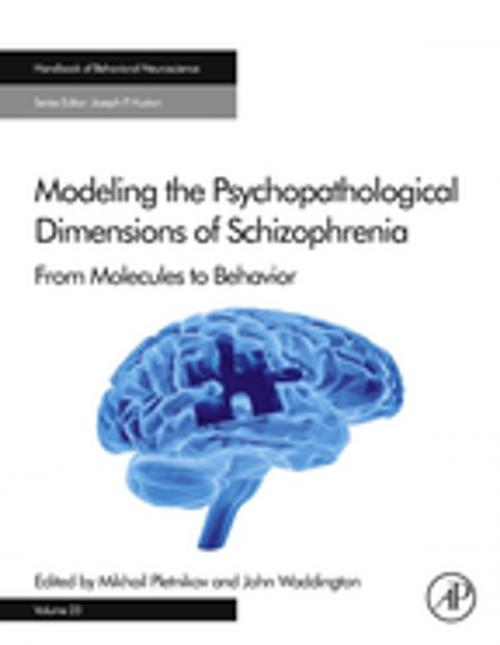Modeling the Psychopathological Dimensions of Schizophrenia
From Molecules to Behavior
Nonfiction, Health & Well Being, Psychology, Clinical Psychology, Cognitive Psychology, Medical| Author: | ISBN: | 9780128011843 | |
| Publisher: | Elsevier Science | Publication: | November 5, 2015 |
| Imprint: | Academic Press | Language: | English |
| Author: | |
| ISBN: | 9780128011843 |
| Publisher: | Elsevier Science |
| Publication: | November 5, 2015 |
| Imprint: | Academic Press |
| Language: | English |
Modeling the Psychopathological Dimensions of Schizophrenia: From Molecules to Behavior is the first book to offer a comprehensive review of the new theoretical, clinical, and basic research framework that considers psychotic illness as a group of dimensional representations of psychopathology rather than as traditional distinct categorical diagnoses. Psychotic illness, typified by schizophrenia, is a devastating condition increasingly recognized as a disorder of abnormal brain development and dysconnectivity. Its complex etiology involves both genetic and environmental factors, as well as the interplay among them.
This book describes the current understanding of the clinical and pathological features of schizophrenia, with a particular focus on the evolving conceptualization of schizophrenia and related diagnostic categories of psychotic illness as combinations of dimensional abnormalities. It provides an overview of modern strategies for generating cellular and whole animal models of schizophrenia as well as detailed reviews of the specific experimental preparations and paradigms aimed at molecular, developmental, and brain-network mechanisms that are the underlying aspects of abnormal behavior and various aspects of schizophrenia.
This groundbreaking book is an authoritative overview of the translational impact of emerging clinical insights on basic research approaches in schizophrenia that will advance the reader’s understanding of the five major dimensions of psychopathology in schizophrenia and related psychoses and resolve the genetic and neurobiological underpinnings of these dimensions.
- Includes reviews of animal models that capture the most recent insights into the etiology and pathogenetic mechanisms of schizophrenia, with an emphasis on the translational potential of these models
- Contains a series of reviews of recently available cellular models for analysis of signaling pathways and gene expression, which complement behavioral neuroscience research in schizophrenia
- Edited and authored by leading researchers in the field of schizophrenia and related psychoses
Modeling the Psychopathological Dimensions of Schizophrenia: From Molecules to Behavior is the first book to offer a comprehensive review of the new theoretical, clinical, and basic research framework that considers psychotic illness as a group of dimensional representations of psychopathology rather than as traditional distinct categorical diagnoses. Psychotic illness, typified by schizophrenia, is a devastating condition increasingly recognized as a disorder of abnormal brain development and dysconnectivity. Its complex etiology involves both genetic and environmental factors, as well as the interplay among them.
This book describes the current understanding of the clinical and pathological features of schizophrenia, with a particular focus on the evolving conceptualization of schizophrenia and related diagnostic categories of psychotic illness as combinations of dimensional abnormalities. It provides an overview of modern strategies for generating cellular and whole animal models of schizophrenia as well as detailed reviews of the specific experimental preparations and paradigms aimed at molecular, developmental, and brain-network mechanisms that are the underlying aspects of abnormal behavior and various aspects of schizophrenia.
This groundbreaking book is an authoritative overview of the translational impact of emerging clinical insights on basic research approaches in schizophrenia that will advance the reader’s understanding of the five major dimensions of psychopathology in schizophrenia and related psychoses and resolve the genetic and neurobiological underpinnings of these dimensions.
- Includes reviews of animal models that capture the most recent insights into the etiology and pathogenetic mechanisms of schizophrenia, with an emphasis on the translational potential of these models
- Contains a series of reviews of recently available cellular models for analysis of signaling pathways and gene expression, which complement behavioral neuroscience research in schizophrenia
- Edited and authored by leading researchers in the field of schizophrenia and related psychoses















